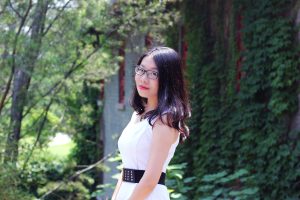Meng Tian is a full-time student on the department’s MSc Education programme, specialising in Higher Education. Before coming to Oxford, she studied at Peking University for her first master’s degree in Chinese Studies, prior to this she completed her BA in Education at Beijing Normal University.
What degree did you apply for and why was it important to you to study this?
I applied for MSc in Education with a specific concentration on Higher Education and it was a significant choice for me, since my previous two degrees in Education and Chinese Studies drove me to my strong interest in the internationalisation reform in China’s HE sector. I also studied at the International Alliance of Research University summer school in Oxford in 2016 and was very impressed by the education system and academic rigour here, so I expected to improve my knowledge on education from a global perspective both on theory and practice by studying in Oxford.
What do you hope to do on completing your degree?
In the long term, I hope to work for HE development and policy sector, preferably in an international organisation like OECD or UNESCO. In the shorter term, I would love to stay in the UK to make more of my experience and I have recenlty accepted an offer to join a UK firm’s graduate management trainee programme, starting in September.
What do you most value about the teaching at the department?
My favourite aspect is how methodology training is well conducted in the department of education, my previous studies were quite lack of methodology guidance and therefore I felt the need to improve my knowledge and skills. The structure of both joint lecture led by the department and the break-out seminars led by each pathway group is very helpful and efficient.
Why do you think it’s important to study education?
I think education is the unique subject since it involves almost every discipline, and for my specialty: higher education, it is more unique, in a good way, to study in higher education with in our own higher education journey, because at times it is actually easy to ignore the concept when we are insiders. Especially in this globalisation era where regions are so much more connected with each other, we as future educator should keep ourselves up with both fundamental theories and frontier practical updates within the education field, and also on the inter-sections between education and other subjects, as well as industries.
What’s the community like at the department?
I think the student-staff engagement environment is very inclusive in the department, the student rep system helps bridge the communication between staff and students effectively, and as an individual student I always feel comfortable walking into our staffs’ office, or dropping an email whenever I have an inquiry, or just some suggestion I would like to seek personally of professionally.

